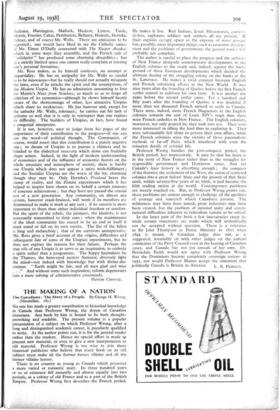THE MAKING OF A NATION
The Canadians : The Story of a People. By George M. Wrong. (Macmillan. 18s.)
No one has made a greater contribution to historical knowledge in Canada 'Omit Professor Wrong, the doyen of Canadian historians. Any book by him is bound to- be both thought- provoking and readable. The present volume is a popular presentation of a subject on which Professor Wrong,• after a long and distinguished academic career, is peculiarly qualified to write. As the author points out, it is for the general reader rather than the student. Hence no special effort is made to present new material, or even to give- a new interpretation to old material. Professor Wrong is too wise to join those historical publicists who believe that every book on an old subject must make all the former heroes villains and all the former villains heroes.
There is no country as young as Canada which possesses a more varied or romantic story: Its three hundred years or so of existence fall naturally and almost equally into two periods, -as a colony of old France• and as a part of the British Empire. Professor Wrong first describes the French period.
He makes it live. Red Indians, Jesuit Missionaries, couriers- de-bois, explorers, soldiers and settlers, all are present. If their exploits occupy space at the expense of more prosaic but, possibly, more important things, such as economic develop- ment and the problems of government, the general reader will probably not complain.,
The author is careful to place the progress and the setbacks of New France alongside contemporary developments in the English colonies to the south and, indeed, against the back- ground of those European developments which decided the ultimate destiny of the struggling colony on the banks of the St. Lawrence. He makes a vivid contrast between English and French colonising efforts in the New World. It was nine years after the founding of Quebec before the first French settler started to cultivate his own farm. It was another ten years before the second settler came. For a hundred and fifty years after the founding of Quebec it was doubtful if more than ten thousand French arrived to settle in Canada. There were, indeed, more French Huguenots in the English colonies towards the end of Louis XIV's reign than there were French catholics in New France. The English colonists, moreover, not only poured in; they took root too. They were more interested in tilling the land than in exploring it. They were substantially left alone to govern their own affairs, while the French colonists were the victims of those paternalistic methods of far-off Paris which interfered with even the minutest details of colonial life.
Professor Wrong handles the post-conquest period, the British period, less impressively. It may be that his heart is in the story of New France rather than in the struggles for responsible government and Dominion status. And yet Canada's later history is absorbing enough ; the conquest of the frontier, the settlement of the West, the union of scattered colonies into a great federal State and the growth of that State until, within seventy-five years of its birth, it tiad become the fifth trading nation in the world. Contemporary problems are merely touched on. But, as Professor Wrong points out, those problems are serious enough to challenge all the qualities of courage and statecraft which Canadians possess. The wilderness may have been tamed, great industries may have been created, but the problem of national unity and consti- tutional difficulties inherent to federalism remain to be solved.
In the latter part of the book a few inaccuracies creep in, while certain statements are made which will undoubtedly not be accepted without question. There is a reference to Sir John Thompson as Prime Minister in 1872 when 1892 is meant. A Canadian judge does not, as is suggested, invariably sit with other judges on the judicial committee of the Privy Council even in the hearing of Canadian cases, and Canada has not yet consuls of her own. Dr. Berriedale Keith would not agree with Professor Wrong that the Dominions became completely sovereign nations in 1931, nor would Professor Munro accept the statement that
po ideally Canada is Britain in America. L. B. PEARSON.






































 Previous page
Previous page